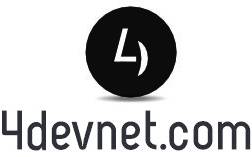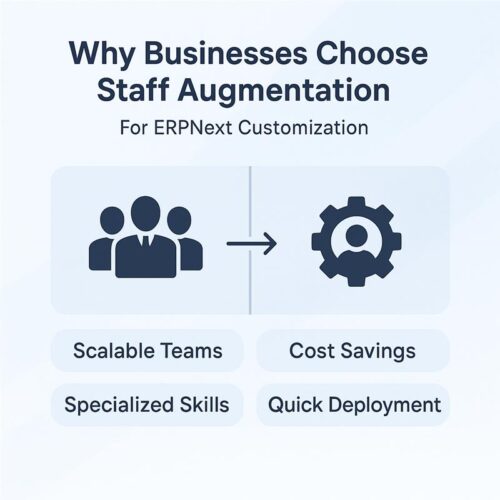Why Businesses Choose Staff Augmentation for ERPNext Customization
In the digital-first era, enterprises across industries are investing in ERP (Enterprise Resource Planning) systems to streamline processes, improve decision-making, and achieve sustainable growth. Among the many ERP solutions available, ERPNext has emerged as a preferred choice due to its open-source nature, scalability, and industry-specific modules.
While ERPNext provides strong out-of-the-box capabilities, organizations rarely use it in its default form. Every business—whether in manufacturing, retail, healthcare, construction, or logistics—has unique workflows, compliance requirements, and operational goals. This creates a growing demand for ERPNext customization.
The challenge arises when businesses do not have in-house ERP experts who understand both technical customization and domain-specific needs. Traditional hiring takes time, while outsourcing often reduces control. This is why many companies today are opting for staff augmentation services for ERPNext customization—a model that bridges the skill gap without long-term hiring commitments.
Understanding Staff Augmentation in ERPNext Customization
Staff augmentation is a workforce strategy where companies hire external ERPNext experts to work as an extension of their internal teams. Unlike full outsourcing, staff augmentation provides flexibility, transparency, and seamless collaboration.
In the context of ERPNext customization, staff augmentation typically involves:
- Hiring ERPNext functional consultants for workflow analysis and module design
- Engaging ERPNext technical developers for custom coding, API integration, and reporting
- Bringing in project managers to align business objectives with ERP deliverables
- Leveraging ERPNext QA/testers for bug-free deployments
This model ensures that businesses have the right expertise at the right time—whether for short-term customization, long-term ERP transformation, or ongoing system enhancements.
Why ERPNext Customization is Essential for Modern Businesses
ERPNext is known for its flexibility, but every business has unique processes that require system tailoring. Some common reasons why companies need ERPNext customization include:
- Industry-specific requirements: A manufacturing company may need custom shop-floor tracking, while a retail chain may need loyalty management and multi-warehouse inventory tracking.
- Localization: Customization is essential for regional tax compliance (e.g., GST in India, VAT in Europe, or state-specific laws in the US).
- Integration: Businesses often require integration of ERPNext with CRM systems, payment gateways, POS software, or eCommerce platforms.
- Scalability: Growing companies need to scale their ERP as operations expand, requiring additional modules or automated workflows.
Without customization, ERPNext may not fully reflect the business’s operational DNA. Staff augmentation ensures these requirements are met effectively.
Why Businesses Choose Staff Augmentation for ERPNext Customization
Here are the key reasons why staff augmentation has become the preferred model for ERPNext projects:
1. Instant Access to ERPNext Talent
The demand for ERPNext experts often outpaces supply. Recruiting full-time specialists can take months, delaying implementation. With staff augmentation, businesses gain immediate access to certified ERPNext consultants, developers, and domain experts with proven experience.
2. Cost-Effective Resource Model
Hiring a permanent ERP team is costly, especially for small and mid-sized businesses. Staff augmentation allows organizations to scale up or down based on project needs, paying only for the expertise required. This results in higher ROI with reduced overhead costs.
3. Flexibility and Scalability
Projects often evolve—new modules may be required, integrations added, or workflows adjusted. Staff augmentation ensures businesses can quickly expand teams without long recruitment cycles.
4. Better Collaboration and Control
Unlike outsourcing, where projects are handed over to third parties, staff augmentation ensures external ERPNext experts work directly with internal teams. This improves communication, maintains transparency, and ensures faster alignment with business goals.
5. Reduced Project Risks
Customization errors can cause delays, compliance issues, or financial losses. With skilled ERPNext experts onboard, businesses reduce risks and ensure a smooth, bug-free customization process.
6. Focus on Core Business Functions
By relying on augmented staff for ERPNext customization, internal IT teams can focus on core innovation, digital transformation, and customer experience—instead of getting stuck in coding and troubleshooting.
Staff Augmentation vs. Traditional Outsourcing for ERPNext
| Aspect | Staff Augmentation | Traditional Outsourcing |
| Control | High – augmented staff works with your team | Low – third-party team handles project independently |
| Flexibility | Scalable as per project needs | Limited – scope is predefined |
| Cost Efficiency | Pay only for required skills | Higher costs for long-term projects |
| Transparency | Direct collaboration and monitoring | Communication gaps may occur |
| Knowledge Transfer | Internal teams gain ERPNext insights | Limited knowledge sharing |
This comparison shows why staff augmentation is the smarter choice for ERPNext customization when businesses want both flexibility and control.
Industry Use Cases of ERPNext Customization with Staff Augmentation
- Manufacturing: Custom modules for production scheduling, quality checks, BOM automation, and shop floor analytics.
- Retail & FMCG: ERPNext integrated with POS, loyalty programs, and supply chain dashboards.
- Healthcare: Patient record management, compliance-driven customization (HIPAA, NABH, etc.), and telemedicine integrations.
- Construction & Real Estate: Project milestone tracking, contractor management, and resource allocation modules.
- Logistics: Customized fleet tracking, warehouse management, and international shipping documentation.
With staff augmentation, businesses in these industries implement ERPNext faster, cheaper, and more effectively.
Challenges in ERPNext Customization (and How Staff Augmentation Solves Them)
- Shortage of Skilled Talent → Staff augmentation provides global ERPNext experts on demand.
- Budget Constraints → Flexible resource hiring reduces overall customization costs.
- Delayed Implementations → Onboarded experts accelerate module deployment.
- Knowledge Gaps → Working with internal teams ensures continuous knowledge transfer.
- Changing Project Scope → Augmentation allows scaling teams instantly without hiring delays.
Best Practices for Choosing the Right Staff Augmentation Partner
If you are considering staff augmentation for ERPNext, keep these best practices in mind:
- Evaluate Technical Expertise: Check if the provider has certified ERPNext developers and domain specialists.
- Check Industry Experience: Choose partners with experience in your vertical—manufacturing, retail, healthcare, etc.
- Focus on Communication: Ensure smooth collaboration between augmented staff and your internal teams.
- Prioritize Scalability: Select a partner that can provide additional ERPNext experts as your project grows.
- Look for Long-Term Support: Customization is not a one-time task; ensure the provider offers ongoing ERPNext maintenance.
Conclusion
Businesses today want ERP solutions that are flexible, scalable, and tailored to their unique operations. ERPNext customization plays a crucial role in achieving this alignment—but success depends on the right talent.
By choosing staff augmentation for ERPNext customization, organizations gain the flexibility, cost-efficiency, and access to skilled professionals needed for smooth ERP transformation. From faster implementation to reduced risks and long-term scalability, staff augmentation empowers companies to stay ahead in a competitive market.
Whether you are a startup in Bangalore, a manufacturing company in Pune, a healthcare provider in Singapore, or a retail chain in Dubai or in Australia staff augmentation ensures ERPNext customization is efficient, future-ready, and business-driven.


